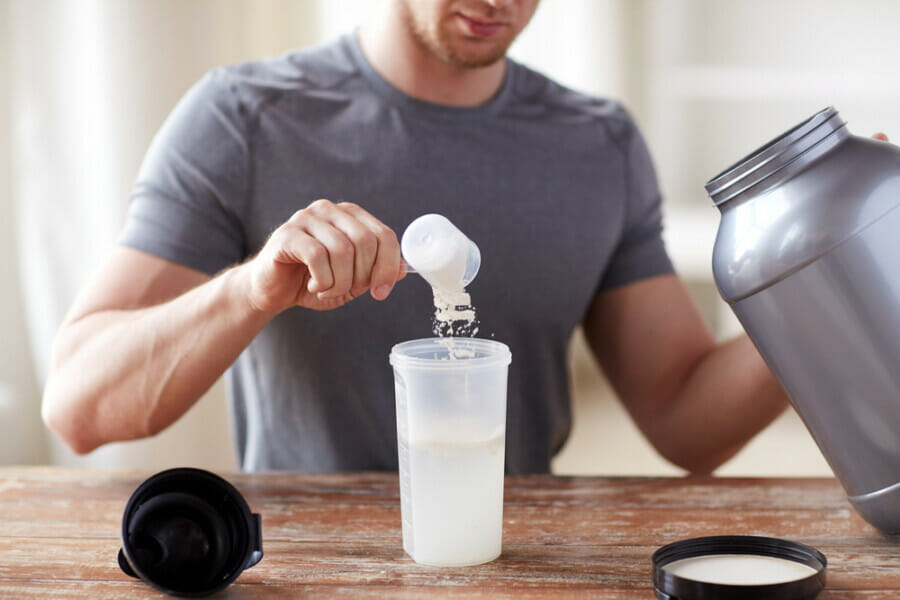How To Pick The Best Protein Powder For You And Your Fitness Goals
**How To Choose The Perfect Protein Powder for Your Fitness Goals**
Many individuals may believe that meeting daily protein requirements is simple through meals and snacks. If you are consuming enough calories and nutrient-rich foods, you might be meeting your needs without even realizing it. However, incorporating an organic protein powder into your routine can assist in maintaining strength and energy levels effectively.
If your aim is to enhance muscle mass, utilizing protein powder in a protein-dense post-workout smoothie can aid in muscle build and repair. Protein powder is especially valuable as a recovery snack and immediate fuel source.
**Why Opt for Protein Powders as a Recovery Snack**
According to Kelly Jones, MS, RD, CSSD, LDN, “While protein powders do not offer more nutritional value or effectiveness in muscle recovery than protein derived from real food, their primary advantage is convenience.” Keeping protein powders handy in your gym bag ensures easily accessible nutrition to combat midday hunger pangs and bridge the gap if it has been too long since your last meal.
Blending an organic protein powder can guarantee a convenient nutrient supply, particularly beneficial for those struggling with reduced appetite after exercising due to various reasons such as stress or certain illnesses.
**The Significance of Protein Powder Labels**
Understanding serving sizes on labels is crucial as they are suggestions and may vary based on individual needs. It is essential to familiarize yourself with label information to determine the appropriate amount of protein powder to use and cater to your body’s requirements.
Moreover, considering your fitness objectives is vital when determining the quantity of protein powder to include in your diet. Different activities may necessitate a varying number of protein powder scoops.
**Choosing the Ideal Protein Powder** based on factors such as protein source, dietary restrictions, additional ingredients, protein quality, amino acid profile, and cost is essential. Taste plays a significant role in selecting a protein powder that you enjoy.
Opting for organic protein powders can ensure purity and high-quality protein. Certifications like NSF or Informed Sport can validate the product’s quality. Consider experimenting with various options to find the best fit for your body and preferences.
**Enhancing Nutritional Value**
Look for protein powders with a protein content of at least 20 grams per 100 calories. Choose options low in sugar, especially added sugar, and utilize healthier sweetener alternatives to prevent blood sugar spikes.
Exploring a range of protein powders can help you identify the most suitable option to incorporate into your diet for diverse nutritional benefits.Erythritol, stevia or allulose are compared to artificial sweeteners like sucralose, aspartame or acesulfame potassium, according to Harris-Pincus. Some individuals opt for unsweetened/unflavored powders that allow them to adjust the sweetness to their preference.
It’s suggested to keep the ingredient list concise and easy to understand, using familiar and safe terms. Look for powders with minimal ingredients, ideally around five, advises Harris-Pincus. If using the powder for a meal replacement without other add-ins like fruit, a small amount of added sugar is acceptable as some carbohydrates are necessary for muscles to efficiently utilize the protein.
For instance, Harris-Pincus recommends incorporating protein powder into a smoothie or shake post-workout containing a total of 15 grams of carbohydrates for meal replacement.
**How To Choose Plant-Based Protein Powders**
One favored option is Garden of Life Organic Plant-Based Sport, revered for its exceptional protein content and plant-based nature. It offers either 15 or 30 grams of protein depending on the number of scoops used. Trista Best highlights the importance of any plant-based protein powder providing a complete amino acid profile with all 20 amino acids, including the 9 essential ones.
Another top choice for organic, plant-based protein is Better Body Foods Organic Protein, delivering 16 grams of protein with just 90 calories. Made from pea and quinoa, it is free from common allergens like soy, dairy, and gluten.
**How To Choose the Best Protein Powders for Weight Gain and Muscle Building**
Carbohydrates and sugars may increase calories rapidly but do not necessarily support muscle building for healthy weight gain. Protein powders generally have low carbohydrate content, with the total carbohydrates often dependent on additional smoothie ingredients.
When selecting a protein powder for muscle gain and weight increase, it’s advised to focus on low carbs and sugars while emphasizing protein, healthy fats, and calorie-rich ingredients like peanut butter and avocado. Opt for whole foods rich in protein, fiber, and healthy fats to enhance calorie intake and support muscle building.
Experts recommend incorporating healthy fats such as avocado, nuts, or seeds into smoothies instead of opting for powders with included oils. For muscle gain, recovery formulas are preferable as they provide a balanced mix of macronutrients alongside protein, ensuring the body receives ample energy from carbs and fats to support protein functions effectively.
**How To Choose the Best Protein Powders for Low-Carb or Keto**
To adhere to low-carb or keto diets, it’s essential to limit carbs and sugars to stay within your carbohydrate limits. Organic, dairy-free, and gluten-free protein powders are generally lower in carbs compared to plant-based options.
While protein powders themselves may have low carb content, the total carbohydrate count can rise quickly based on other ingredients added. Fiber-rich foods like leafy greens are beneficial for low-carb diets and should be paired with protein powders that are lower in carbohydrates.
It’s recommended to maintain a low fiber content in protein powders if experiencing post-exercise appetite suppression and ensure enough fiber intake from whole plant foods throughout the day. Select protein powders that align with your body’s reactions and preferences based on personal experiences.
**How To Choose the Best Protein Powders for Maximum Protein Absorption**
Whey protein is highly recommended for maximum protein absorption. Whey protein, in the form of meal replacements, can boost protein intake, promote muscle mass, and enhance satiety. It also contributes to bone density, provides extra calcium, and contains cysteine, an essential amino acid for producing glutathione, a potent antioxidant.
Individuals on a gluten-free diet should opt for gluten-free protein powders for post-workout recovery shakes and meal replacement smoothies. A preferred choice is BiPro Elite Whey, known for its five ingredient composition, absence of fillers or artificial flavors, sugar-free nature, gluten-free, hormone/RBST-free, kosher certification, and recognition by the National Science Foundation (NSF).BiPro is considered safe for use in sports as it does not contain any banned substances, according to Harris-Pincus. Each serving of BiPro provides 2.55 grams of leucine, an amino acid crucial for muscle building. For those following a gluten-free diet, whey protein powders can be used if they are labeled as gluten-free as well.
If you have dietary restrictions, such as being dairy-free, opting for plant-based protein powders like Orgain Organic Protein Powder can be a suitable choice. This protein powder is not only gluten-free but also organic and plant-based, making it versatile for various dietary needs.
Soy protein can be an effective alternative for individuals with dairy allergies or digestive issues related to whey protein. NOW’s Soy Protein Isolate is a high-quality option rich in amino acids, including over 2 grams of leucine, and holds an Informed Sport certification for athletes.
Ancient Nutrition Multi-Collagen Protein is a recommended choice for skincare and overall health benefits. This protein powder combines collagen and protein, offering consumers both collagen benefits and a moderate amount of protein per serving.
Combining whey and collagen in protein powders can provide a complete amino acid profile. Biochem Collagen Plus Protein blends collagen peptides with whey protein isolate, offering a grass-fed protein source without artificial additives.
Collagen protein powder, such as Orgain Collagen Peptides, can be added to coffee for convenience. It typically contains 35 calories and 10 grams of collagen hydrolysate per scoop, offering a versatile option for boosting protein intake.
While collagen protein may aid in joint injury recovery, it is advised to primarily rely on food as your protein source rather than solely depending on collagen supplements for workout recovery.














